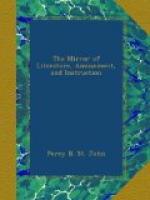* * * * *
A DUTCH TALE.
A ballad of Roosje is perhaps the most touchingly told story which the Dutch possess. It is of a maid—a beloved maid—born at her mother’s death—bred up ’midst the tears and kisses of her father—prattling thoughtlessly about her mother—every one’s admiration for beauty, cleverness, and virtue—gentle as the moon shining on the downs. Her name was to be seen written again and again on the sands by the Zeeland youths—and scarcely a beautiful flower bloomed but was gathered for her. Now in Zeeland, when the south-winds of summer come, there comes too a delicate fish, which hides itself in the sand, and which is dug out as a luxury by the young people. It is the time of sport and gaiety—and they venture far—far over the flat coast into the sea. The boys drag the girls among the waves—and Roosje was so dragged, notwithstanding many appeals. “A kiss, a kiss, or you go further,” cried her conductor—she fled—he followed, both laughing:—“Into the sea—into the sea,” said all her companions—he pushes her on—it is deeper, and deeper—she shrieks—she sinks—they sink together—the sands were faithless—there was no succour—the waves rolled over them—there was stillness and death:—The terrified playmates looked—
“All silently,—they look’d
again—
And silently sped home—
And every heart was bursting then,
But every tongue was dumb.
“And still and stately o’er
the wave,
The mournful moon arose,
Flinging pale beams upon the grave,
Where they in peace repose.
“The wind glanc’d o’er
the voiceless sea,
The billows kissed the strand—
And one sad dirge of misery
Fill’d all the mourning
land.”
Foreign Quarterly Review.
* * * * *
ENGLAND AND HER COLONIES.
The discouragement of colonization is certainly not the feeling of the great majority of the people of England, and it is equally certain that it is not the policy of this empire. Whatever may be the fate of the several British colonies at some future and distant period, it is something at least to have spread our laws and language, and moral character, over the most distant parts of the globe. The colonies that speak the language of Old England—that preserve her manners and her habits—will always be her best customers; and their surplus capital will always centre in the mother country. It was not the opinion of our ancestors, that colonies were an incumbrance; they—good, stupid souls—imagined that colonies enlarged the sphere of commerce—–that commerce required ships—that ships created seamen for manning the royal navy, and that the whole contributed to individual wealth, to the national revenue, and the national strength; and such we believe




